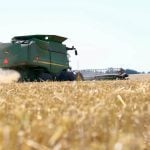GRANDE PRAIRIE, Alta. — Gareth Pugh has seen the good and the ugly sides of estate and will planning and prefers the good side — the planned.
Not having a will may cause devastating consequences for farming families, but having an old will can cause just as many problems, said the lawyer specializing in estate planning.
“An old will can be just as dangerous as not having one in the first place, especially when life circumstances change. I have clients come in and their will is one page and it was done in the ’70s or ’80s. These wills often don’t name their adult children as executor or may name individuals they have lost touch with. Even worse, we may forget exactly what it says and explain the contents of our will incorrectly to our children. This can have devastating consequences for the child that was led to believe they were getting much more than they end up receiving.”
Read Also

A power of attorney document may no longer be enough
Recently, some financial institutions have begun imposing their own internal form of “verification” requirement with respect to powers of attorney.
Over the years, courts have ruled specific clauses must be included in wills to make them legal. New wills also include clauses that grant access to technology like emails, social media and online banking.
“We used to tell our clients to wait and over the course of three months most of the bank statements will arrive and you will have a good idea of what that asset pool consists of. That doesn’t happen anymore. Digital assets are involved in most estates and it is important to get access to email accounts and phones and without specific wording in the will there may be a risk the service provider might deny access to an account. These are important clauses we are including now to avoid potential court orders.”
Having an updated will is one part of farm estate planning. It is not just a single document, but part of a holistic plan designed for each farm, said Pugh.
“Many clients commonly hold the misconception that estate planning revolves solely around the execution of a will, leading them to assume that once this document is finalized, their obligations are fulfilled. However, it is crucial to recognize that a will represents just a single component within the comprehensive framework of estate planning. Given the uniqueness of each scenario, it is of utmost importance to engage with your succession planning team, which delves into the intricacies of the involved assets and client objectives.”
Pugh said he deals with young farm families who need to ensure a guardian is named for the children. As families age and acquire assets, the will evolves toward the division of assets.
“Every family dynamic is so unique. There is no one size fits all solution.”
Pugh said the starting point is knowing the goals of the individual. Do they have specific assets they know they want to go to a specific place, no matter what.
“In that case, use specific bequests to make sure those assets go to the intended destination.”
Pugh said there may also be a clause in the will for the equal distribution of personal property to the beneficiaries. The items may not have monetary value, but they do have sentimental value and may cause fissures in the family.
In one case, five brothers fought over their mother’s costume jewelry, valued at $5,000. It cost more to find a resolution.
Pugh discourages people from including a laundry list of items in the will, naming a specific person to be gifted a certain truck or boat. A detailed list in the will adds complications if the items are no longer around.
Instead of a list in the will, Pugh suggests the person make a typed list separate from the will to give guidance to the executor. Once he had a will with more than 30 beneficiaries and was forced to go to court to clarify the wishes of the estate.
“This handwritten will simply wasn’t clear, resulting in a lot of work for the executors. Some of the gifts no longer existed, had been sold, were improperly described, including both land and bank account numbers. Several undated, handwritten changes were made with various colours of ink. This was a scenario from a law school exam. The deceased knew where they wanted to leave assets to many individuals important to them, but by failure to execute a proper document, their clear intention was difficult to determine. We had to go to the courts to ask for advice and direction, to help to interpret this will and determine what do we do with it now. This adds stress, time and a lot of cost and of course the risk the deceased’s intentions are not followed through with.”
Pugh recommended checking the will every couple years to ensure it still reflects your current situation.
“I have clients that come and sit down for five or 10 minutes and ask if their document is still relevant and in need of changing. In some cases, these current documents are perfectly fine. The fear of legal bills shouldn’t be something that prevents someone from coming in and ensuring the future is planned for properly. If a change is minor, we can often prepare a codicil, which is simply an addition to the existing document.”
Having a will gives control to the survivors and not to the government.
In Alberta, if a person dies without a will, it is said to be intestate and the legislation dictates the priority of who becomes the executor. The courts would name the executor in a specific priority of spouse, children and parents, but that may not be ideal.
“Without a will, nobody is appointed to act as executor and your intentions for the distribution of your estate are unknown. A spouse will have first priority to apply. If there isn’t a spouse or they don’t want the job, then it goes to the children, but it might be a scenario where you have a mix of farming and non-farming children, or the children might not get along. In these circumstances, the presumption is all the children have equal priority.
“A lot of people fear when they pass away the government will take away their money if they don’t have a will. While that situation isn’t impossible, it is highly unlikely because we do have a priority in place when people pass away without a will. The priority might just not be what the person would have desired.”
Picking an executor may be one of the most important parts of the will and it should not be looked at as picking favourites, but rather it should be about choosing the best person for the job.
“It is not a wonderfully rewarding job. It is one that simply has to get done. In the farm context, naming an executor is crucial because the farm is an ongoing business. It is important that we choose people with a background of farming knowledge. Often there are immediate decisions that need to be made such as buying inputs, selling inventory, caring for livestock, and maintaining equipment. The right person is crucial.”
Trying to figure out how to leave fair shares to all the children is not easy. Pugh points to one situation with a family of five and two of the children had been farming for decades, and the parents planned to gift the entire farming operation to the farming children. Pugh suggested the parents have a valuation on the land and equipment to help the parents understand the values given to each child.
“They didn’t appreciate at first what the discrepancy would be amongst the children. It’s no secret that farmers are asset rich and cash poor. In this instance, the client was able to understand this decision would result in several millions of dollars going to these two children and only tens of thousands going to the remaining children.”
There is nothing wrong with the decision, but there needs to be clear, documented discussions that an unequal distribution was documented and intentional.
Pugh recommends clients do not put their children’s name on land title to avoid probate fees after death.
“Adding children’s names to titles for estate planning purposes has its place but in some cases, the risks can often outweigh the benefits. In farming situations, I’ve seen where the parents have added a child’s name to title on their own and then there is a falling out years later. What seemed like a good idea at the time can be devastating. If the need ever arises to have to try to sell the land to assist in a transition to a lodge, or extended care, difficulties can arise. Unintended consequences in terms of estate planning and tax considerations can also arise, underscoring the importance of engaging in comprehensive discussions with the succession planning team to explore all available options.”
As his clients age, Pugh recommends they spend some of the money they have saved. If he is visiting a client in a lodge, it is not uncommon for them to have a couple million in the bank, but sitting on a 30-year-old chair. He suggests they buy a nice mattress, chair or television. If they are still able to travel, he recommends they travel.
“Enjoy it. That is the number one advice I give to my clients. While it’s important for many to leave a legacy, they’ve worked hard and deserve to spend some of that money as well. Some decide to purchase items that make the last years more comfortable, others give gifts to those who can say thank you. When I hear they have followed through on that advice, it signifies our contribution to assisting their pursuit of fulfilment.”















